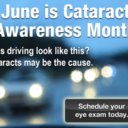Tips on Cataracts and Eye Floaters
June is Cataract Awareness Month. Did you know by the age of 80, more than half of all Americans either have a cataract or have had cataract surgery?
What happens when you have a cataract?
Cataracts are a clouding of the lens of the eye, which prevents the passage of light into the eye. Seeing with cataracts is like looking through a frosty or fogged window. Cataract sufferers may also experience sensitivity to light, see “halos” around lights, notice fading or yellowing colors or have double vision in one eye.
The solution to cataracts is cataract surgery, which requires a surgeon to remove the deteriorated lens and replace it with an artificial lens called an intraocular lens or IOL. There are over 3 million cataract surgeries performed in the US each year with each surgery lasting about 20 minutes. Recovery time is minimal and most people can resume normal activities fairly rapidly.
Diseases such as diabetes, lifestyle choices such as smoking, excessive alcohol use, and prolonged exposure to UV rays all can contribute to your chances of developing cataracts.
Did you know there are different types of cataracts?
- Secondary cataract. A side effect of the cataract surgery procedure affecting approximately 1/3 of the people who have had surgery is that cataract symptoms return. The side effect is called posterior capsule opacification, also known as a secondary cataract.
- Traumatic cataract. Cataracts can develop after an eye injury, sometimes years later.
- Congenital cataract. Some babies are born with cataracts or develop them in childhood, often in both eyes. These cataracts may be so small that they do not affect vision. If they do, the lenses may need to be removed.
- Radiation cataract. Cataracts can develop after exposure to some types of radiation.
Moving Spots Called Eye Floaters
Do you ever see moving spots that appear in your field of vision? They’re called eye floaters and could be especially noticeable when you look at something bright, such as white paper or a blue sky. As you age, often between the ages of 50 and 75, the vitreous and its millions of fine collagen fibers shrink and become shred-like. Shreds can accumulate in the vitreous that can cause a change in the amount of light that hits the retina — the light-sensitive tissue in the back of the eye. This change causes the symptoms of eye floaters.
Eye floaters can be annoying, but they generally don’t interfere with your sight and can improve over time. These floaters come in many shapes such as black or gray dots, squiggly lines, threadlike strands, which can be knobby and semi-transparent, cobwebs, or ring shaped.
But sometimes eye floaters are a sign of a more serious condition as a result of a retinal detachment, retinal tear, or bleeding within the eye. You should seek immediate medical attention if you notice a sudden increase in the number of eye floaters or the floaters are accompanied by flashes of light or a loss of side vision.
Annual eye exams to include dilation can detect the onset of cataracts, eye floaters, as well as other types of eye disease. These preventive measures, along with healthy eating will help to maintain overall eye health. Call 724-444-6767 or 724-226-4444 to schedule your exam today!
About Bissell Eye Care: John D. Bissell, OD owns and operates Bissell Eye Care servicing Northern Pittsburgh and Alle-Kiski Valley regions. With two locations to treat patients, we offer evening and Saturday appointments. Bissell Eye Care provides comprehensive eye examinations for the entire family beginning as early as 6 months, ocular disease detection and treatment, eyeglasses, sunglasses, activewear, contact lenses, and low vision examinations for those with significant vision loss. We accept most types of vision and health insurance plans. For more information, visit bisselleyecare.com or call our Bakerstown Office at 724-443-6767 or Natrona Heights office at 724-226-0444.

